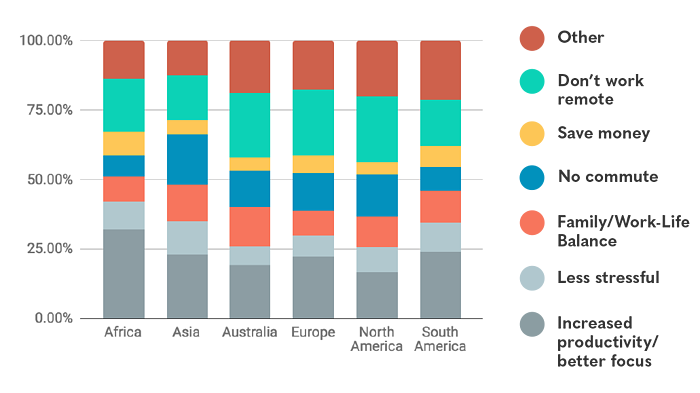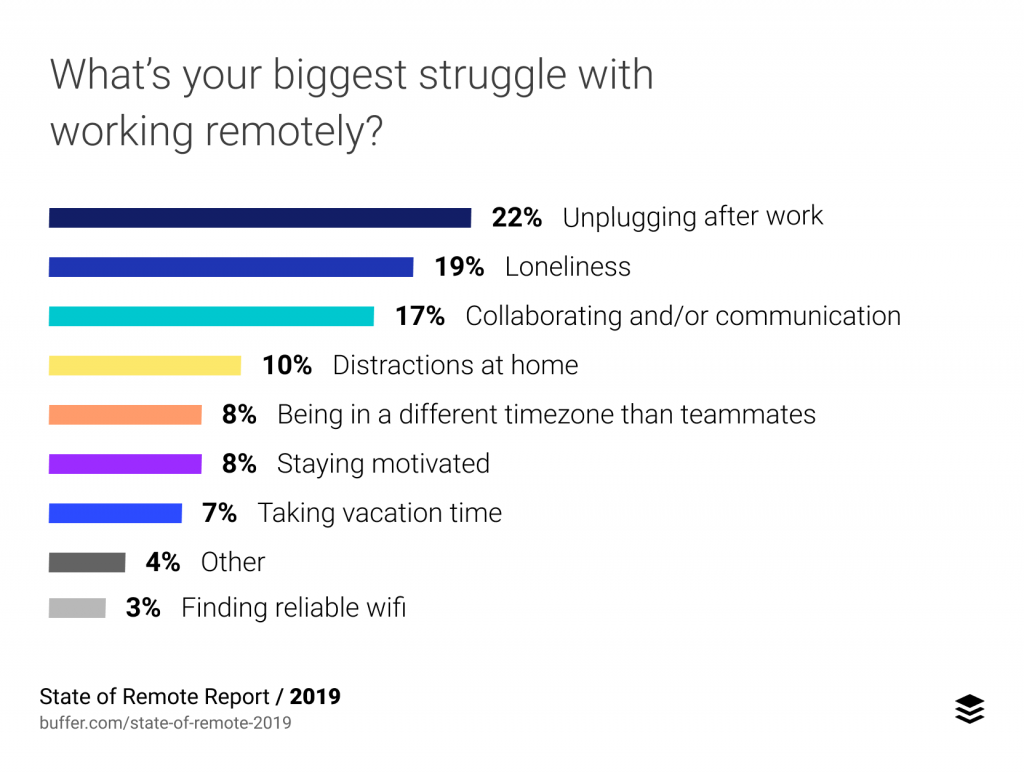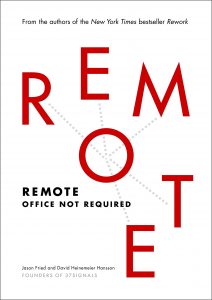Newsletter Signup - Under Article / In Page
"*" indicates required fields
‘For all those who are sitting in traffic right now.’
Today’s workers are tired of being tied to any one place. The standard 9-to-5 workday confined to a designated office doesn’t work for everyone anymore. Having flexible work options—such as the freedom to choose when, where, and how you perform your work—have become a growing priority for young professionals and one of the key factors in a fulfilling career. Remote-work trends seem to be gradually dominating the modern workplace. Why do companies embrace this culture, and how is it becoming the new norm?
According to the World Health Organization (WHO), a big economic cost of mental illness ($1 trillion per year) stems from workers’ reduced productivity. While much has been discussed on embedding wellbeing into personal development plans (e.g., mindfulness practice) to improve work output, we seldom realize that workers’ wellness can really benefit from good working practices. Good working practices can include employee autonomy, effective management, and leadership, as well as building a good company culture that supports the team’s ability to work effectively.
At Labiotech, our culture reflects how we work. Productivity is something we talk a lot about (e.g., how to manage emails and use your Mac to better optimize your time), and it can be achieved in many ways. Remote working is one of them. We have implemented this concept (and love it) because flexible working policies not only leave us space for creativeness and innovativeness, but also boost our team’s morale (which has been shown to impact positively on work output) and allow us to build trust with our colleagues. It can be tricky to set up, but easy enough to maintain when good guidelines are implemented and when good time management and prioritization are carried out.
If you’re still not tired of this topic (and are dying to know more), stay with me!

Before diving into a long list describing the benefits of remote work, let’s first look at the stats. OwLabs did an interesting survey analyzing how employees think about this concept and their motivations for taking part in remote working. A total of 3,028 employees worldwide across 6 continents participated in the poll, and the results were fascinating. Here are the 10 key findings we think you need to know.
10 key facts about remote work in 2019
- 56% of global companies allow remote work (including fully remote companies and ‘hybrid’ companies that offer both remote and in-office options); 16% of them are fully remote.
- 68% of employees work remotely at least once per month.
- Those who work remotely at least once a month are 24% more likely to feel happy and productive than those who don’t.
- Companies that offer remote-friendly options see 25% less staff turnover than those that do not.
- Working remotely does NOT negatively impact employees’ investment in their work.
- 69% of millennials will trade other work benefits for flexible workspace options.
- Remote work increased 22% from 2017 to 2018.
- Every year, US remote workers prevent 3.6 million tons of greenhouse gas emissions by not commuting.
- 77% of people said a job with flexibility would allow them to be healthier (eat better, exercise more, etc.); 86% said they’d be less stressed; 97% said it would have a positive impact on their overall quality of life.
- 76% of employees said they’d be more loyal to their employers if they had flexible work options.
It seems that employees are happiest when they have a choice. But why do people choose to work remotely?
To increase productivity and achieve better focus
The top reason people choose to work remotely is to focus better on their work. If you ask people where they go to really get their work done (if they’re being very honest), very few would say the office, or perhaps they’ll tell you that they arrive early, stay late, or sneak in on the weekend when no one else is there. Modern offices generate a lot of interruptions, like meetings, calls, another meeting, the inevitable business lunch… Your days are chopped into tiny bits, and the work just doesn’t happen as efficiently as it could. The ability to be alone with your thoughts is one of the key advantages of remote work—it allows you to settle into your own productive zone and get meaningful work done.
Why do people choose to work remote?

Image from Owl Labs: The State of Remote Work Report
To stop commuting their life away
Nobody enjoys commuting. You hit snooze every five minutes until the last attempt before missing the train. You get stuck in traffic, losing time and patience and arriving at work grumpy. Maybe you have to skip the gym, miss your son’s football game, and then feel too exhausted for a meaningful conversation with your partner. These are definitely not enjoyable experiences. Imagine the 300-400 hours you lose per year just sitting in traffic (if we consider spending 1.5 hours/day commuting), not to mention the carbon footprint generated from your daily commute. Research even shows that long commuting negatively impacts our health with high risks of obesity, insomnia, stress, somatic pain, high blood pressure, depression…and the list goes on. Stop commuting your life away and start thinking about what you could do with that extra 400 hours a year.
To achieve a healthy work-life balance
Imagine having breakfast with your family without rushing, taking half an hour over lunch to play with your kids, or simply being there for a sick family member without missing a full day of work. Having family close and available is a good way to counterbalance the loss of daily in-person contact with coworkers. Working remotely—especially from home and on flexible hours—can drastically change the dynamic of your daily work routine and help you achieve a true work-life balance without guilt and stress!
To pursue their passions now, while they’re still working
“When I retire, I’m going to travel the world,” is a common dream, but why wait for retirement? You should stop using the “but I have a job” excuse to procrastinate fulfilling your dreams. Nomadic freedom is an option for remote workers that would have seemed impossible not too long ago: now you have the luxury and flexibility to see the world without giving up your career.
To stay away from bad weather
If your office is like ours, located in a city like Berlin where winter is unbearably long and depressing, the perfect way to weather the wintertime blues is probably to escape to the warmer corners of the world—another benefit of remote working! This of course depends on your company’s remote work policy. At Labiotech, our winter office guideline allows Labiotech-ers to work remotely for a longer period of time (2 weeks maximum in a row). This rule applies to any time during the year, not just in winter.
To change their scenery (and perspective) as often as they like
Routine has a tendency to numb our creativity. Change of scenery, however, can lead to all sorts of new ideas. One of the benefits of remote work (and also my favorite one) is the opportunity to be influenced by different environments (change of cafes, change of neighborhood, change of crowd…), to reset your mind and to take in more perspectives than you normally do if you have to work in the same place at the same time every day. Such variety also translates to our work and has an impact on the way we think. Looking at a problem from different angles is often beneficial in finding the best solution.
To recharge and better connect with people
If you’re an introvert, giving up seeing your colleagues in person every day can be a big relief. Introverts prefer environments that are calm and have minimal stimulation. Too much noise or interaction drains an introvert’s energy so that they need to recuperate away from the hustle and bustle. Psychologist Susan Cain says that remote technologies are a major boon for introverts, as many feel most comfortable participating in conversations or group work when they have time to think before they speak (or type). Remote work gives introverts an opportunity to recharge and to again go out into the world and connect really beautifully with people! 💐
To thrive on a remote team as an extrovert
It could be argued that remote work can be a real challenge for extroverts, who mainly gain energy through interactions with people. But this doesn’t have to be true. One can be passive about social interaction when working in an office environment, as it’s an inherent part of the day, while in a remote world you have to be intentional about in-person socialization. This helps you recognize the social activities you’re truly passionate about, prioritize them appropriately, and allocate your energy for the times you want. Working remotely also allows you to focus more on engaging in the culture of the team and building relationships while in the office, and this type of focus builds a sense of community where extroverts thrive.

Sounds amazing. If it’s such a great idea, why hasn’t remote working taken off yet?
The concept of remote work is not new. The reason some companies still haven’t been practicing it all along is simple: they couldn’t. The technology just wasn’t there. Nowadays, good work no longer happens only from 9am to 5pm in offices within cubicles. A key transition to remote working is going from traditional synchronous collaboration to asynchronous collaboration. To achieve that, you need the right technology to allow employees to work anytime, anywhere—it’s as simple as that! Below is a list of tools you need to work happily without borders.
A laptop
Reliable Wifi
Headphones, a mic, and a camera
A quiet place without distractions
It could either be a home office or a coworking space. Regus, for example, has more locations around the world than anyone else.
Online tools
Google Hangouts, Dropbox, Google Docs, a project management platform like Trello or an instant messaging tool, such as Slack, are what we use at Labiotech while working remotely to stay aligned with our team.
Can’t wait to give remote work a try? Here is a complete guide to turn you into a pro!
Although remote working sounds fantastic, it also has its downsides. The three main concerns addressed by remote workers include being unable to unplug after working hours, loneliness, and poor communication. To be a happy and mentally healthy remote worker, we don’t want to worry about not being seen or heard just because we’re not with our colleagues in person. Here are some tips to help you resolve these complex issues.

Image from Buffer: State of Remote Work Report 2019
Build a routine
Working from home offers you a lot of freedom, but without clear boundaries, things can get out of control. Most people need some sort of routine to help them structure their day while working remote. It can be helpful to divide your day into chunks like catch-up (emails), collaboration, and serious work. Make sure that real work only happens when you’re in your dedicated home office space—no checking email in the living room or bedroom. Another tip is to separate the clothes you wear to distinguish whether you’re in work or play mode so you don’t confuse your state of mind.
Communication is everything
A survey revealed that less than half of global professionals trust their employer, boss, or colleagues. While the survey only included responses from employees not engaging in any remote work, the trust factor can get more complicated for remote or hybrid teams where at least some remote work is taking place. “If I can’t see them, how do I know they’re working?” If you work remotely often, make sure you’re not being ignored. At Labiotech, we believe transparency is the key to building trust with the team. We use #outofoffice on Slack to stay connected with everyone when we are not there, and it has been working very well! Don’t hesitate to update your colleagues on how it went at the dentist or what you had for lunch (even better with a picture). They’d be interested to know, trust me.
Technology is your best friend
It can get a bit annoying when you have problems accessing files when working as a group and your teammate is not there to help. Project management is thus very important for efficient remote working. Make sure you always work with a shared file system (such as Google Drive), constantly update your Trello cards, and prevent any problems for your colleagues even if you’re not (physically) there. Be a reliable, trustworthy team member, and avoid being late to meetings while working remote. Always test your call setup in advance and (ideally) put the camera on so people can see you and feel (as if) you were there with them. Lastly, make sure you’re reachable by phone in case of any emergencies. When it comes to trust and respect, it’s always these little things that make the difference.
Beware of flagging team spirit
If you can, avoid remote work during important company events. It’s probably the only time outside work you can create true personal connections with your colleagues. And of course, don’t forget to balance the team spirit when you’re back in the office, even if you just go out to lunch with your colleagues every once in a while.

Life as a remote worker
“In thirty years’ time, people are going to look back and wonder why offices ever existed.” – Richard Branson
Remote work is not a trend. It’s already happening, and it’s here to stay. It isn’t simply a different way of working, but a different way to live. Always keep your brain refreshed, and stay flexible and adaptable to embrace the new landscape of work in the future.
Ready for remote? Welcome on board!
If you’re keen to learn more about remote working, this book is a great one!
Remote: Office Not Required by Jason Fried & David Heinemeier Hansson

Images from Shutterstock, Buffer, and Owl Labs






